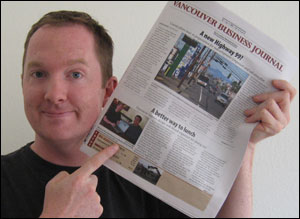 I’ve mentioned my former co-worker and fellow Director programmer Nathan Pryor before because he’s a bright guy with a good sense of humor and a hell of a sense of fashion (that’s him on the left in the photo).
I’ve mentioned my former co-worker and fellow Director programmer Nathan Pryor before because he’s a bright guy with a good sense of humor and a hell of a sense of fashion (that’s him on the left in the photo).
Nathan and a two-jobs-back co-worker (can’t this guy settle down?) were featured on the front page of the Vancouver Business Journal today for a Web tool they sort of publicly launched on April Fool’s day this year called Niblz.com.
Vancouver natives Nathan Pryor and David Shireman were tired of spending precious lunchtime minutes trying to decide where to dine. Trying to coordinate several peoples’ tastes and schedules was tiresome and downright boring.
The friends met in 2000 working at Vancouver-based HOSTS Learning Corp., and to solve their near-daily dilemma, Pryor developed a simple, web-based program to do the work for them.
“We thought, ‘Couldn’t we have someone just decide for us?'” Shireman said. “The Internet does everything else for you.”
The site, which they’ve since refined and made available to public at NIBLZ.com, allows one user to invite friends out to eat electronically.
The user chooses several local restaurants from a database, sets a date and time, then the site emails selected lunch pals, who vote on where they’d like to dine.
The event planner also gets a vote, and when voting closes, the site tallies the votes and emails each attendee the “winning” restaurant.
Read all about it.
My own front page appearance in the Portland Business Journal was so long ago that it’s not even online. Ahhh, to be young again.

